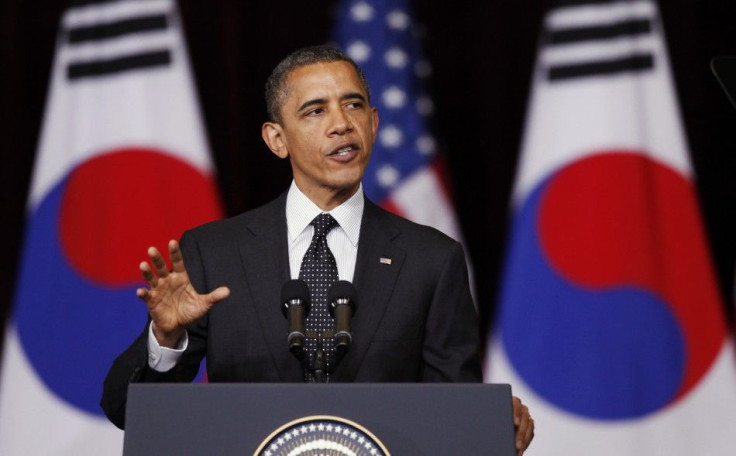Obama And China Warn North Koreans Against Rocket Launch

U.S. President Barack Obama and Chinese President Hu Jintao will work together to prevent North Korea from going ahead with its planned long-range missile launch.
Leading up to the nuclear security summit in South Korea this week, Obama and Hu both expressed their serious concern about the launch, which was first described by North Korea as a peaceful launch of an earth observation satellite.
We both have an interest in making sure that international norms surrounding non-proliferation, preventing destabilizing nuclear weapons, is very important, Obama said.
South Korea, the country that feels most threatened by the North Korean rocket launch, said it would go as far as shooting down [parts] of a North Korean missile in case they stray out of their normal trajectory. Moreover, the new partnership between the U.S. and China may be the best chance to stop what Obama and many other nations consider to be a violation of United Nations resolutions.
Given China's relationship with North Korea, its influence on North Korea, the president felt it was very important for us to be working closely with China and for China to be sending a very strong message to North Korea, Ben Rhodes, a U.S. deputy national security adviser, told reporters in Seoul.
However, Rhodes was reluctant to say how effective that message might be, citing incidents in the past when Pyongyang ignored warnings from Beijing.
China has expressed those concerns before, and North Korea has continued on with its behavior, he said. China needs to look at whether it needs to be doing more.
The North Korean long-range missile launch, planned for mid-April, breaks with a recently signed pact in which Pyongyang agreed to suspend rocket tests in exchange for increased shipments of U.S. food aid. Obama, who visited the demilitarized zone on Sunday and gazed north to what he described as a time warp of despair, thinks that Kim Jong-un and the North Korean leadership are driving the country astray for pride's sake.
It's not clear exactly who's calling the shots and what their long-term objectives are, Obama said of North Korea during a speech in Seoul.
But regardless of the North Korean leadership, what is clear is that they have not yet made that strategic pivot where they say to themselves, `What we're doing isn't working. It's leading our country and our people down a dead end.'
In a related statement, China said on Monday the country hopes to share its peaceful nuclear know-how with its neighbors. At the summit, Sun Qin, president of the China National Nuclear Corp., announced China is willing to work closely with other Asian nations to improve the security and safety of nuclear power plants, according to Xinhua.
Sun added that because nuclear safety is an issue that transcends borders and politics, China, which has had nuclear weapons since the 1960s, is offering security training, fuel production and storage facilities to the Asia-Pacific region. China would also like to work with neighboring nations to establish a new communication and industrial support systems in case of disasters similar to the Fukushima meltdown last March in Japan.
© Copyright IBTimes 2024. All rights reserved.











